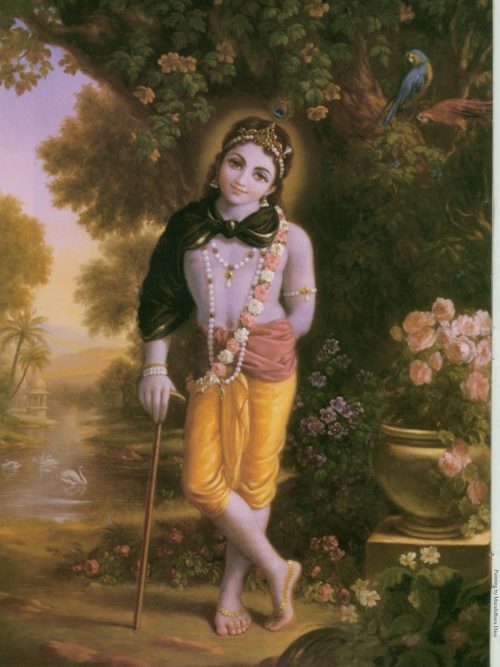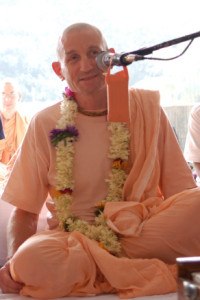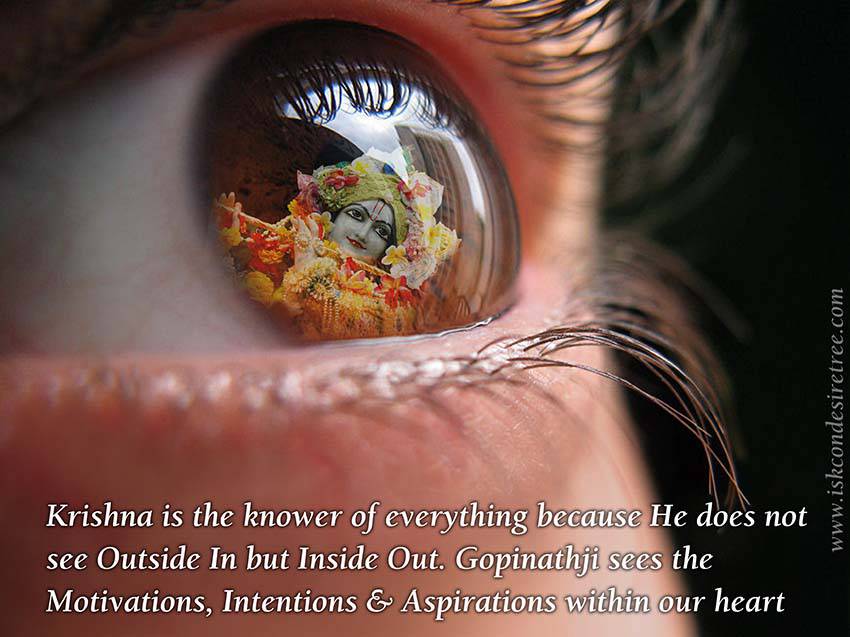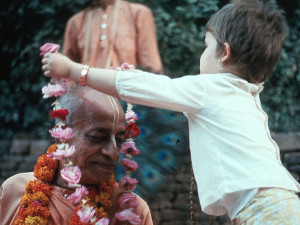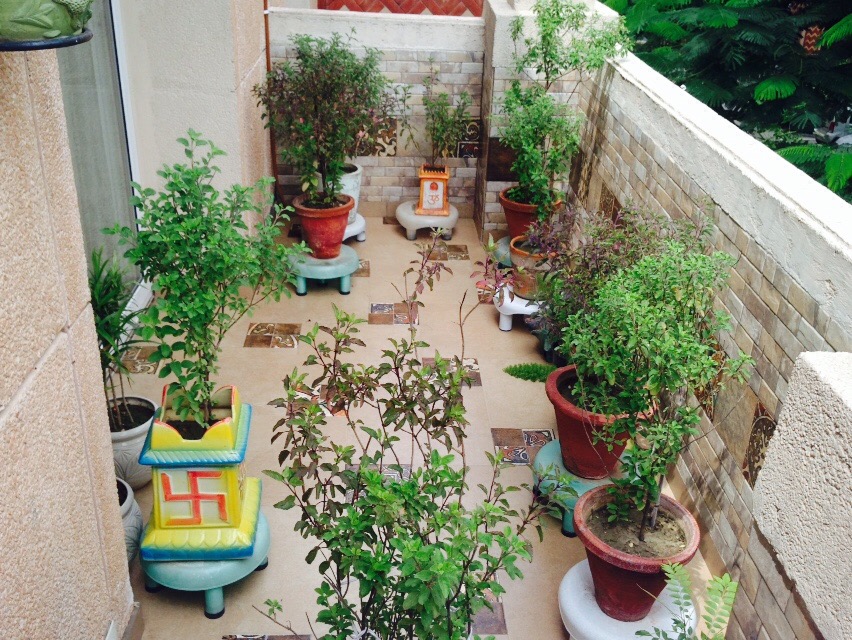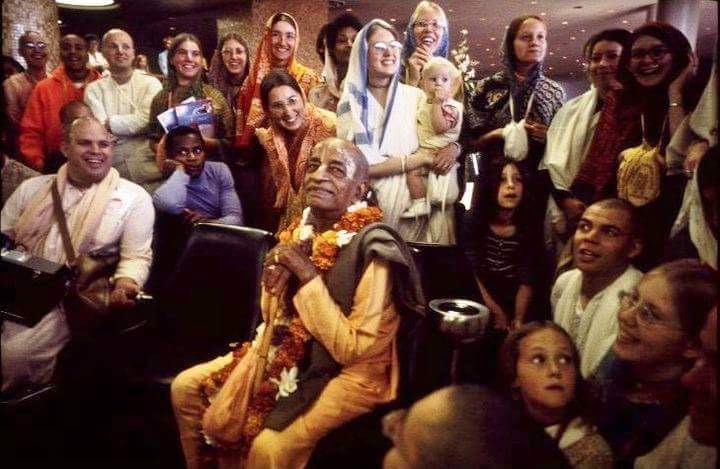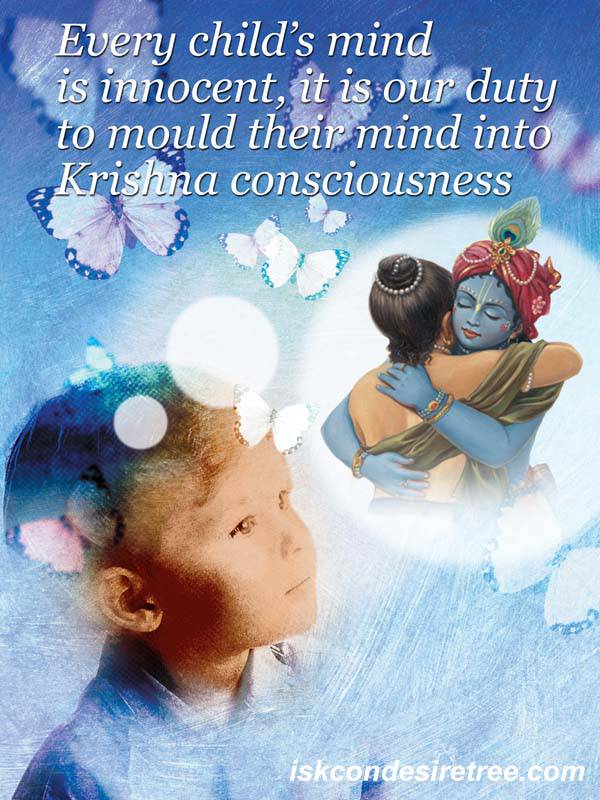Hare Krishna.
8th August, 2015. Gurgaon
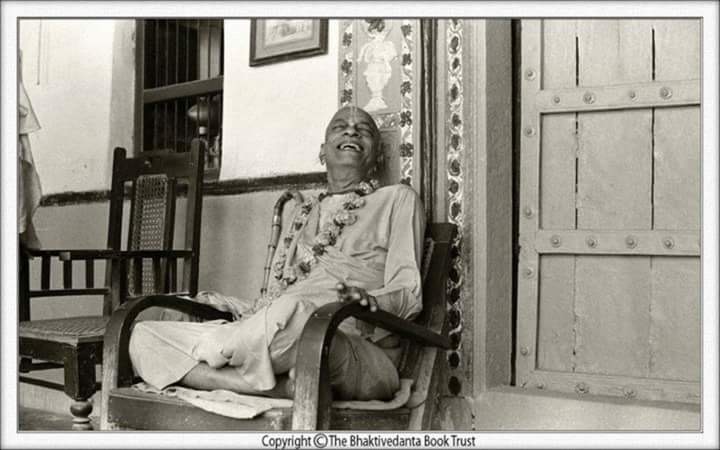
Since yesterday morning I am down with a bad cough & fever, I took this opportunity to catch up reading Srila Prabhupada’s conversations with his disciples. They so nectarean and guide a neophyte like myself on how to preach. We see how so many times Srila Prabhupada’s young disciples will take the opposite side with the arguments put in by Karmis and Prabhupada will smash their arguments and teach them how to preach with full conviction in the science of Krishna consciousness.
I am copying a room conversation Prabhupada had in October 4, 1975, Mauritius. Please keep a pencil and paper handy as you will read so many gems for collection.
Prabhupada: But the size of the body has changed.
Brahmananda: The size has changed. It has grown, increased.
Pusta Krsna: It looks different, completely… It looks different. There is no similarity.
Prabhupada: Yes. There is no similarity. Why the child… There was no mustaches. Why you have mustaches? How you can say “The same body”? You shall have to give your own argument. Child had no mustaches; you have got now mustaches. How you can say the same body? The child had no sex desire; now you have got sex desire.
Brahmananda: They would say all these things are dormant within the child’s body, and now they are coming out.
Prabhupada: That we also say, but that body not… That “dormant” means dormant in the soul, not in the body. That is the knowledge. Dormant it is, but dormant in the soul, not in the body.
Pusta Krsna: They have to admit that it’s a different body because if the body is simply made of food and they are eating so much and evacuating so much, then it has to be a different body.
Prabhupada: No, it is different body, undoubtedly. If they foolishly argue, that is different thing. Therefore rascal. Their argument has no value. How you can be the same body? So many changes. The body is changed.
Prabhupada: So this argument, how he can refute, that he has died twenty-two years?
Pusta Krsna: Well, he can also say that he has lived twenty-two years, because he has no perception of any life before that time. He can’t remember living before.
Brahmananda: “Before, I was not alive. Now I am alive, so I have lived for twenty-two years. Before, I was dead; I was not alive. Now I am alive, so I’ve been alive for twenty-two years.”
Prabhupada: So before, you were not alive. Then how your life came?
Pusta Krsna: The combination of…
Prabhupada: Do it. Again foolishness. These rascals… (laughs) Then, if you can create life, then where is the question of dead body? You create again. Give life again. If you are so competent that you can give life, combination, then this dead body is there. You bring chemicals and inject.
Pusta Krsna: The same chemicals are there, too. The same chemicals, living body, dead body — five minutes before, five after — is the same chemicals. But they can’t explain why there is such a drastic difference.
Prabhupada: What is that same chemical?
Pusta Krsna: In the living body, two minutes before death and two minutes after…
Prabhupada: So what is that? Name that, what is that chemical. Then bring it.
Pusta Krsna: Let him try and make life. Not possible.
Prabhupada: If you know the chemical, then you bring it. Chemical is available. Why this is dead? What they will answer? What this chemical is wanting, that it is dead?
Brahmananda: Well, we may not know…
Prabhupada: Then, you rascal, why you are talking? You do not know. (laughter)
Brahmananda: But, then, neither do you know.
Prabhupada: Huh? No…
Brahmananda: You can say soul, but you don’t…
Prabhupada: No. But you cannot answer my question; therefore you are more rascal than me. You cannot answer. Your… You are…
Harikesa: You have the position. He’s in a position. He cannot answer.
Prabhupada: Yes. You say that chemical is missing. I say what is that chemical?
Pusta Krsna: No, but the chemical is not missing.
Prabhupada: Then?
Pusta Krsna: The same chemical is there. Two minutes before death and two minutes after death, the body chemistry has not changed so much.
Prabhupada: No. What is that missing that it is dead?
Pusta Krsna: They can’t answer.
Prabhupada: Therefore they are fool. You cannot answer.
Pusta Krsna: Because it’s not a question of chemical. Actually they don’t know what life is.
Prabhupada: Therefore they are foolish. Therefore he has to take knowledge from Krsna: dehino ‘smin yatha… “Within this body there is soul.”
Brahmananda: You say there’s a soul, but we’ve never seen a soul. It may be your imagination.
Prabhupada: You may not see. You have not seen your forefather. That does not mean… This is all bad argument. Why do you believe? Your eyes are so imperfect; still, you say, “I did not see. I want to see.” What is the value of your eyes? You see the sun globe — a small disc. But is it so? Then how do you know that it is so big?
Pusta Krsna: By hearing.
Prabhupada: By hearing. That is important, not by seeing. Therefore sruti, Veda, is important, not your eyes.
Harikesa: When people die, though, there is usually some cause. Like they have a heart attack or they get hit by a car or some disease. So that death is caused by the disease…
Prabhupada: That is not the cause. That is the effect. You foolish, do not know. You are taking it, cause.
Harikesa: Well, when you get hit by a car, that’s a cause.
Prabhupada: Just like one man becomes insolvent, loses everything. So he said that “I had no money. Therefore I become insolvent.” But that is not the fact. He could not manage; therefore there was scarcity of money and he became failure. So that is effect. On account of his bad management, he came to a position that he could not pay to his creditor, and his business is failure. So that insolvency is not the cause. It is the effect.
Pusta Krsna: Bhisma was able to remain in his body even on a bed of arrows.
Prabhupada: So when you are going to die, these are the… On account of imminent death, these are the effects.
Harikesa: But that means that the body breaks down.
Prabhupada: Hm?
Harikesa: The body breaks down.
Prabhupada: At a certain period it will break.
Harikesa: So that is the cause, the body breaking down.
Prabhupada: Yes. So you say heart failure is the cause. No. The body is breaking; therefore heart failure.
Harikesa: So death means the body breaks.
Prabhupada: No, no. First of all your answer… You say the heart failure is the cause. The man is dying. I say that because the man is dying, the heart is failure. So heart failure is not the cause. It is the effect.
Harikesa: That’s very difficult…
Pusta Krsna: Because his karma in that body is running out, he has to leave.
Brahmananda: But if I can get some machine that will make the heart keep on beating, then the man won’t die.
Prabhupada: No. That you are failure. You have got so many machines. You go on, keeping the heart going on. That is not possible.
Harikesa: Finally they just pull out the plug. The doctor kicks the plug one day.
Prabhupada: (laughs) Yes.
Cyavana: They are afraid of death. No one wants to die.
Pusta Krsna: They are afraid someone will take them off the machine, too.
Cyavana: We want to live as long as we can.
Prabhupada: Then you have to accept that your killing child, abortion, that is sinful.
Cyavana: It’s easier for the mind to accept what is apparent to the senses. For example, to accept that I am this body is easier for my mind than to accept a philosophy which you say that we are not this body. That is very difficult for my mind to accept, whereas I can accept very immediately that I am this body.
Prabhupada: Because it is difficult, therefore you are a fool. That proves that you are a fool.
Cyavana: Why should I strive for something so difficult, such a philosophical understanding, when I can live very happily with this body?
Prabhupada: But because you do not want to die. You want happiness.
Cyavana: So I can enjoy this body.
Prabhupada: You cannot. That is the difficulty. You want, but you cannot. You want. That I know. But you cannot do it.
Harikesa: You never see happy people.
Prabhupada: That is their ignorance. They are accepting unhappiness as happiness.
Brahmananda: Well, in this world there has to be some unhappiness and there has to be some happiness.
Prabhupada: But we are trying to give you happiness only, no unhappiness.
Cyavana: But that’s not possible.
Brahmananda: That’s artificial.
Prabhupada: That you say, but we know.
Cyavana: We cannot see.
Prabhupada: You cannot see, but you will see if you be trained up. That is Krsna consciousness movement.
Cyavana: But it is easier for us to remain here and enjoy a little bit and accept a little suffering, accept this body.
Prabhupada: Therefore Krsna said that “Bhagavad-Gita should be discussed amongst My devotees, not amongst the rascals.” It will be waste of time. Ya imam paramam guhyam mad-bhaktesv abhidhasyati. Find out this verse.
Pusta Krsna:
ya idam paramam guhyam
mad bhaktesv abhidhasyati
bhaktim mayi param krtva
mam evaisyaty asamsayah
[Bg 18.68]
“For one who explains the supreme secret to the devotees, devotional service is guaranteed, and at the end he will come back to Me.”
Prabhupada: Not to the fools and rascals. So first of all, to give them chance, let them come to the temple, take prasadam, hear sankirtana, offer obeisances by imitating others. In this way, when they become little devotee, then instruct. Otherwise it will be useless. You’ll waste your time by arguing.
Pusta Krsna: You have given the example that the field has to be plowed before the seed is sown, cultivated.
Prabhupada: Yes.
Cyavana: The mind has to want that higher taste.
Prabhupada: Ceto-darpana-marjanam [Cc. Antya 20.12]. So this process… Bring the… Invite them. Chant Hare Krsna, dance, give them prasadam. Everyone will take part in this way, not immediately instructing that “You are not this body; you are soul.” He will not be able to.
Cyavana: It’s too difficult.
Prabhupada: Therefore this process is recommended. Caitanya Mahaprabhu argued with Sarvabhauma Bhattacarya, Prakasananda Sarasvati, not with ordinary public. Ordinary public — “Go on chanting Hare Krsna and dancing.” Never argued, neither He discussed Bhagavatam. For ordinary public-four hours’ kirtana, chanting and dancing, bas. And then give them sufficient prasadam: “Take prasada.” This process… Because unless he has got little sraddha, he will simply put some false argument and waste your time. Not in the beginning. Mad-bhaktesv abhidhasyati. First of all create him a devotee a little. Chant Hare Krsna-harer nama harer nama harer namaiva kevalam [Cc. Adi 17.21] — only. Because this is Kali-yuga, people are so fallen, so downtrodden, so rascal, cats and dogs. It is very difficult. But this process — chanting of Hare Krsna maha-mantra, giving them chance to hear it and take prasadam — that will cure. And that is easily accepted by anyone. It doesn’t matter what he is. Anyone will accept. To chant and dance and take prasadam — no one will disagree. So this is the process. When they come to the temple… Just like these boys. You are offering obeisances; they are also offering. But that will go to their credit, to become bhakta. This process should be adopted. Not in the beginning, but in the beginning give them prasadam, chant Hare Krsna. And try to sell some book. You pay something. That means he is giving some service, the hard-earned money. That will also go to his credit. And then, when he’ll concerned that “I have paid for it. Let me see what this nonsense has written. All right. Read.” And that will also convince him. This is the way. He’ll keep this body, book, and show some friend, so the infection will go on.
Cyavana: We can see in some of our boys in Kenya. Practically they have no education and very little intelligence, but still, they are doing everything. They’re falling down. They are offering all the prayers. They are taking prasadam. They are chanting. They are doing everything, even they don’t have the intelligence to understand why.
Prabhupada: You said that no chemical is missing.
Pusta Krsna: No chemical difference.
Prabhupada: But why it is dead?
Pusta Krsna: The body is dead? Well, they haven’t been able to determine that yet.
Prabhupada: Then they are rascals. There is no argument because you do not know.
Cyavana: They say “fate.” They say “There is fate.”
Prabhupada: Faith we have got, but you have no faith.
Cyavana: Not faith. Fate.
Prabhupada: What is that fate?
Cyavana: Predetermined, predestined.
Prabhupada: Who made it, the predestination?
Pusta Krsna: Higher controller.
Prabhupada: Then you have to accept some higher authority, God.
Cyavana: But he is not a person. He is not a person.
Prabhupada: Whatever it may be. That is another thing. That is another question. But you have to accept some superior authority. As soon as you accept fate, destiny, then you have to accept superior authority.
Cyavana: They also say “nature.” They say “by nature.”
Prabhupada: Whatever it… Whatever it may be. You have to accept some superior authority. That means you are not independent. You are under the control of the superior authority.
Harikesa: Time. Time is…
Prabhupada: Whatever it may be. You call by any name. That is another thing.
Pusta Krsna: These bodies are a reaction, effect, isn’t it? These bodies are an effect.
Prabhupada: Yes.
Pusta Krsna: So then death also must be some effect.
Prabhupada: So who has made this law, cause and effect? Some way or other, you have to accept that you are not independent.
Harikesa: Their arguments are so foolish, it’s hard to think of them.
Prabhupada: Yes. Therefore mudha, they have been described. Na mam duskrtino mudhah [Bg. 7.15]. They are being kicked, punished; still, he says, “Oh, I don’t care for anybody.” I kick on your face. “Yes, I don’t care for you.” Like that. This is their argument.
Pusta Krsna: Ahankara-vimudhatma.
Cyavana: But because everything in this world appears to be disordered, it is difficult to accept…
Prabhupada: The world is not in disorder.
Cyavana: But it appears to be.
Brahmananda: Man makes order.
Prabhupada: Man makes order?
Pusta Krsna: Is… Your idea is that he conceives of the order. But actually there is no order, but he…
Prabhupada: When there is cyclone, man can stop?
Cyavana: For example this beach is all disorder. There is so much rubbish there. There is no order to this world. So how can there be any higher authority…
Prabhupada: So what you can do?
Cyavana: I cannot accept that there is a higher authority when everything is simply disorganized. These trees are broken, the…
Prabhupada: It is organized. It is organized. For thousands of years the sea is there, the beach is there. So sea cannot come here. This is order.
Cyavana: But the line of the beach is all crooked and…
Prabhupada: That is your imperfect vision. It is perfect.
Harikesa: People think, “Straight and corners, that is very nice. If everything has corners…”
Prabhupada: That is your concoction.
Cyavana: Like a building, straight.
Prabhupada: Just like if you think that “Why keep to the left? Why not right?” You think like that, but that is ordered by the superior. You can think in your own way.
Cyavana: Because it appears that way to my senses, therefore I think that…
Prabhupada: Therefore it is authority. You can think like anything, but it will not be done according to your desire. It will be done by the authority’s desire. That is authority. You cannot dictate the authority that “You do like this.” That is not authority. You think any way; that is your business. But authority will do in their own way.
Harikesa: Actually, nobody cares about philosophy. Nobody follows philosophy.
Prabhupada: No. He cares for death. That is the ultimate philosophy, that they have to die. Say, “I don’t care for this order. I’ll not die.” Then your disobedience is all right. But you have to die. You have to become old man. How you can disobey?
Cyavana: So if death is imminent, then I should simply try to enjoy myself as long as I can.
Prabhupada: Enjoy. What is that enjoyment if you are going to die?
Harikesa: It’s so incredible how crazy everything is.
Brahmananda: Well, at least before I die, I can get as much pleasure as I can.
Prabhupada: Nobody can, if he is actually afraid of death. Suppose if you are given a beautiful woman — “Enjoy, and as soon as you come out I will shoot you.” (laughter) Will you enjoy?
Pusta Krsna: That’s a great example. That example would change the world.
Prabhupada: That is the difference between a man of knowledge and a fool. Man of knowledge, that is that he knows he has to die. “But I don’t wish to die. So what is the solution?” That is man of knowledge.
Harikesa: Sometimes they say “Well, why worry about death? It’s gotta happen anyway, so why should we worry?”
Prabhupada: But you… You… Because you are rascal number one, you don’t worry, but that is the psychology. This is the example.
Harikesa: But I want to enjoy right now.
Prabhupada: Suppose that you enjoy this woman for few minutes. Then you will be shot down. Then will you be able to enjoy?
Brahmananda: Actually they do that. When some man is to be executed in the prison they give him one woman the night before as a special consolation.
Pusta Krsna: They finish him off completely. They ruin him. (laughing)
Cyavana: But death is very far away from me. I am only thirty years old. I don’t have to worry about death.
Prabhupada: What is the guarantee that you will live thirty-one years? What is the guarantee that you will live thirty-one years? There is no guarantee.
Cyavana: But everyone else around me appears to be having fun and enjoying.
Pusta Krsna: They can use this argument though, Prabhupada. I’ve heard it before, that “So God has placed us in this world. Okay, there is God, and He has placed us in this world, and He has created the world also, and He has made these things very, very enjoyable, sex life, and this and that. So why not enjoy if God has created it?”
Prabhupada: That is foolishness. That is foolishness. It is not enjoyable. That is… If a criminal says, “The prisonhouse is very enjoyable,” it is like that.
Cyavana: But all the travel brochures and the advertisements, they say it’s nice here. All the advertising and travel brochures, they say it is nice.
Prabhupada: Let him say, but prison house, is it nice? That is foolishness.
Cyavana: But everyone else says it’s nice.
Prabhupada: Everyone? I don’t say.
Cyavana: You are the only one who says it is not nice.
Prabhupada: I am the only intelligent person. (laughter) That’s a fact. Mudho nabhijanati.
Pusta Krsna: Krsna says, antavat tu phalam tesam tad bhavaty alpa-medhasam: [Bg. 7.23] “Men of small intelligence worship the demigods, and their fruits are limited and temporary.” So does this mean that these less intelligent people who are simply interested in temporary benefit… Even they don’t worship demigods per se, it could be anyone.
Prabhupada: Yes. Demigods… Yes. Just like one who is trying to get some good service. So they are worshiping this boss, that boss. That is also demigod, because without flattering some boss he cannot get some good job; without flattering the voters he cannot get the ministership. That is demigod worship. They have to flatter somebody. Why this Ram Gulab has gone to…? He has to flatter there. This is going on. The big bosses in the United Nation, they are demigods, supposed to be. He thinks, “If I flatter them, then I will be able to keep my position.” But he does not think that this position will be lost after some years. Tad bhavaty alpa-medhasam. He has forgotten his eternal life, Krsna, and he is flattering these demigods. That’s all. What he will gain? He will die. That’s all. At the time of death what these United Nation leaders will do?
Cyavana: But we can improve the standard for future generations, for our children.
Prabhupada: First of all you improve your own condition; then think of future generation. You are going to hell and thinking of future generation. You are going to die, and you are thinking of future generation. Who is your future generation? That is another foolishness. This is asuric civilization. Asuric civilization.
Cyavana: Hope against hope.
Prabhupada: Hope, that is also foolishness. Apart from future generation, you have got sons. So you are taking very great care. Does it mean that his life is guaranteed? So what you can do? You cannot do anything for your present generation, what to speak of future generation. You cannot do. Suppose your son is sick. As father, you have given first-class medicine, first-class physician. Does it guarantee that he will live? Then what can you do? Is it in your control that your son will live because you have given good physician, good medicine? Is it guarantee that your son will live? Then what can you do? You cannot do anything for your present generation, and you are thinking of future generation, which you do not know, who is your future generation. At the present moment you know this is your generation, you cannot do anything, and you are thinking of future generation. How foolish you are.
Cyavana: Well, we may have to accept the laws of nature, but at least we can…
Prabhupada: And therefore, what is the meaning of taking care of future generation or this generation?
Cyavana: At least we can make it comfortable in this world.
Prabhupada: No. That is not possible. You have already given good medicine, good physician. And why he is dying? You cannot do anything. That is your position. You may try to do, but that is futile. Ultimate is different.
Cyavana: So by giving him medicine, maybe I can give him a better chance…
Prabhupada: “Maybe” can be, but it is not guaranteed. You cannot do anything.
Cyavana: But at least I should try.
Prabhupada: Try. Foolishly you try whatever you like. That is another thing. But it is not under your control. You can try. That is your… Of course, you must try as a dutiful father, but you should know that you cannot take any guarantee or do anything, good or bad. That you have already said, “the destiny.” That is prominent. That is prominent, not you.
Cyavana: The tendency of the humans…
Prabhupada: You can do the best to train your child to become Krsna conscious. That is in your power. That you can do. That is the best service, not anything else. That is not possible. If you become yourself Krsna conscious, and if you try to make your son Krsna conscious, that you can do. And that is the duty, real duty. Other things, you cannot do anything. That is destiny. And if you make him Krsna conscious, then destiny can also be changed. This is the concession of Krsna consciousness. Destiny also can be changed. Karmani nirdahati kintu ca bhakti-bhajam [Bs. 5.54]. One who comes to Krsna consciousness, his karma is also changed.
Cyavana: Is that karma dovetailed?
Prabhupada: Yes.
Cyavana: It’s still there.
Prabhupada: Still can be changed by bhakti. Just like one man is condemned to death. Nobody can change it, but the king can change it. Only by the mercy of king he can be saved, not otherwise. Even the judge who has punished him, he cannot do it. Whatever is ordered, there is order. He cannot change it. Similarly, if you become devotee, then your destiny can be changed. A devotee never is anxious to change his destiny. That is devotee’s…
Pusta Krsna: Like Maharaja Pariksit.
Cyavana: But if his destiny takes him away from Krsna, then he is not…
Prabhupada: That is Krsna’s desire. If Krsna desires, He can do anything. So a devotee does not interfere with Krsna’s desire.
Pusta Krsna: We know that Krsna desires everyone to become Krsna conscious.
Prabhupada: Oh, that is… Krsna says. That is His desire. Sarva-dharman pa…, mam ekam saranam vraja. That is Krsna’s desire.
Pusta Krsna: So Krsna is not causing everyone to forget Him.
Prabhupada: No. Krsna’s desire is open to everyone. We don’t accept it. That is our obstinacy. Krsna says “There is soul.” We do not say. “No, there is no soul.” This is our position. Krsna says, “Within this body there is soul,” and we don’t accept. We’ll argue. This is our position. He is giving direct instruction, “Yes, there is soul,” but we don’t accept. Disobedient.
Cyavana: But if Krsna knows that we will suffer in this material world, why does He let us go away from Him? Why doesn’t He keep us there?
Prabhupada: Eh?
Cyavana: If Krsna knows that we will suffer here in this material world if we come here, why does He let us go?
Prabhupada: Why the thief goes to the prison house? He knows that “If I go to the prison house, I will be put into distress.”
Cyavana: But the government is not strong enough to force him not to go, not to steal.
Prabhupada: Why government is not strong enough?
Cyavana: The government doesn’t have the power to control everyone. But Krsna can…
Prabhupada: No. Even if he’s strong enough, you disobey. The government has made so many things that you cannot steal, the iron chest, but still, you are clever enough that you do.
Pusta Krsna: The independence is there. Sometimes people ask, Prabhupada, that if the spiritual world is anandamayo ‘bhyasat (Vedanta-sutra 1.1.12), full of bliss, then how is it that, somehow or another, we’ve left that blissful situation and come into this hellish…
Prabhupada: This argument we have talked many times. Everyone knows that out of prisonhouse freedom is there. Why he goes to the prison house? Everyone knows it. Why does he go to the prison house?
Pusta Krsna: Not by choice. He is placed there.
Cyavana: Krsna is the supreme controller. If He wanted to check us from going there, He could check us from going into the prison, from offending.
Prabhupada: No. Krsna has given you independence. So you are…. By mentality, you have to suffer. Suppose if a child wants to do something, play, if you check it, check it, then he will go mad. Just like mother Yasoda was showing stick to Krsna, and when Krsna became so much afraid, he (she) became immediately anxious: “Oh, Krsna has too much anxiety. He may fall sick.” So immediately throw away. So this is father-mother’s affection.
Cyavana: So actually it is Krsna’s mercy that He allows us to come here, free ourselves from…
Prabhupada: Yes. Yes. He has given you little freedom. He doesn’t want to take your freedom.
Harikesa: You gave two examples in Los Angeles about the master, big master, like president of DuPont walking his dog. The president of DuPont is walking his dog in Central Park. The dog makes him go this way and this way and this way. And you said we are just passing stool and urine in the material world, and Krsna is just letting us run here and there.
Prabhupada: Yes. Anumanta. In the Bhagavad-gita it is said, anumanta, upadrasta.
Cyavana: In the Caitanya-caritamrta in one of your purports you gave the example of Paramatma being compared to when there is a circus in a village the government sends one inspector to watch over the activities. Then, when the circus goes, he is no longer there. Could you explain it? (pause)
Pusta Krsna: Prabhupada, if Krsna is the reservoir of pleasure, then what does He need us for? If Krsna is all blissful, then what… We’re so, it seems, incapable of pleasing Krsna. He is so magnanimous. What does He need us for?
Prabhupada: He does not ask for Himself. For you. If you come to Krsna and enjoy with Him, that is your good. He is self-sufficient. He doesn’t require.
Pusta Krsna: Sometimes, Prabhupada, when they see your Bhagavad-gita, they say, “Oh, it is too big for me to read.” They don’t know that the purport…. They’ve never read.
Prabhupada: Therefore I say that bring them, let them chant and dance and take prasadam. That, everyone will hear, agree.
Harikesa: One who does that, he is preaching? One who arranges for chanting and dancing and taking prasadam, that is as good as preaching?
Prabhupada: Yes. Sravanam, kirtanam, arcanam — anything.
Harikesa: These festival programs are very important.
Prabhupada: (pause) You have to spend or waste gallons of blood before you can convert a person to Krsna consciousness. It is so difficult task.
Cyavana: You have to spend?
Prabhupada: Gallons of blood, waste.
Cyavana: In what way?
Prabhupada: By talking with him, with the rascal and foolish. You tax your brain and spoil your energy, blood.
Harikesa: Spend so much food.
Cyavana: So we should do that.
Prabhupada: Unless you are not a preacher. You should be prepared. Yes. They cuts, sacrifices life, what to speak of wasting blood. Wasting life. This is preacher. Then he is recognized by Krsna: “He has done so much for Me.”
Pusta Krsna: Krsna will give more and more energy.
Prabhupada: He is going to die for Krsna, and therefore he is recognized. Na ca tasman manusyesu kascin me priya-krttamah [Bg. 18.69]. You become immediately very dear to Krsna. Your business is how to become very intimate to Krsna. That will be served by preaching.
Cyavana: Would you like to hear this verse?
na ca tasman manusyesu
kascin me priya-krttamah
bhavita na ca me tasmad
anyah priyataro bhuvi [BG. 18.69]
“There is no servant in this world more dear to Me than he, nor will there ever be one more dear.”
Prabhupada: Who? Ya idam para…
Pusta Krsna: “For one who explains the supreme secret to the devotees, devotional service is guaranteed, and at the end he will come back to me.”
Prabhupada: Yes.
Pusta Krsna: Sometimes… I’ve had one person. He complained, “Why is there no purport for this verse, ‘There is no servant in this world more dear to Me than he, nor will there ever be one more dear’?”
Prabhupada: No purport?
Pusta Krsna: Yes. They have mentioned that there is no purport for this verse.
Prabhupada: It is already explained. Anyone who is preaching…
Harikesa: That verse is self-effulgent.
Pusta Krsna: Yes.
Harikesa: You are the purport.
Pusta Krsna: Simply people are trying to find out ways that they don’t have to surrender to perfect knowledge. They can go on enjoying in the material world.
Prabhupada: Wanted… (indistinct) A little… (indistinct)
Harikesa: I think you should preach every breakfast. Your appetite is very good.
Prabhupada: Hm?
Harikesa: Every breakfast you should preach. Then your appetite will be very good.
Prabhupada: No, appetite or no appetite, I preach. (laughter) I do not preach for increasing appetite.
Reading the above we can very well imagine the kind of energy with which Prabhupada boldly preached. We also see how diligently Prabhupada taught his disciples in the art of preaching. I found so many wonderful gems in a single room conversation. His spirit to preach is contagious even while reading his conversations! Such is the eternal presence of His Divine Grace Srila Prabhupada among his disciples and followers.

All glories to Srila Prabhupada.
All glories to Sri Guru and Gauranga.
28.483949577.0779792
Like this:
Like Loading...
